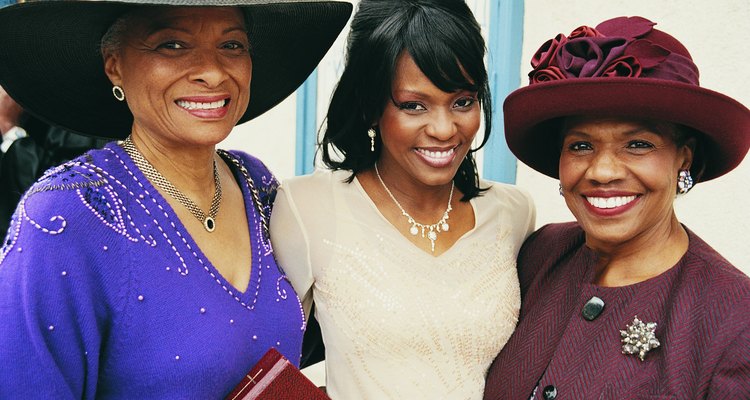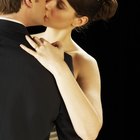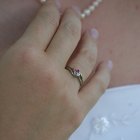
Digital Vision./Photodisc/Getty Images
The Pentecostal movement, which emerged in the early 20th century, places a central focus on being baptized in the Spirit with evidence of speaking in tongues and ecstatic worship services. Today the Pentecostal Church is not only one of the largest traditions within Christianity but one of the largest religious movements in the world. Denominations within Pentecostalism, for example, include the Assemblies of God, the Churches of God in Christ and the United Pentecostal Church International, but the movement also has several nondenominational churches as well. As with most large religious movements, rules for women differ widely from one denomination or church to the next.
Jewelry and Clothing
Like many Christian denominations, Pentecostal churches encourage women to dress modestly defined by each denomination or church. For example, the United Pentecostal Church International defines modesty as a refusal to wear any clothing or accessory that might incite a man to lust. This includes low-cut shirts, makeup and jewelry with the exception of watches -- and wearing pants -- as the rule declares that pants make the contours of a woman's lower body clearly visible. Women in this church are forbidden to have short hair. In practice, these rules are more strictly enforced in some churches than in others. The Assemblies of God merely insists that women use their own discretion in choosing how to dress, offering a warning against tattoos and body piercings, but permits jewelry.
Roles in the Church
Pentecostalism began as an egalitarian movement with racially integrated churches and women in key positions of leadership. But as the movement developed its formal structure, some denominations created rules limiting the ability of women to teach and preach. Basing their authority on biblical passages forbidding women from usurping authority over men, UPCI asserted that a woman could teach as long as she submitted to a man's leadership. Women in these traditions have gone on to play key leadership roles as prophets, entrepreneurs and co-pastors. The Assemblies of God and the International Church of the Foursquare Gospel, basing their authority on scriptural examples of women in leadership, place no restrictions on women in ministry.
Media and Entertainment
The United Pentecostal Church officially forbids its members from engaging in "activities which are not conducive to good Christianity and Godly living," a category that includes mixed bathing, unwholesome radio programs, visiting theaters of any kind, owning a television and all worldly sports and amusements. These rules apply equally to men and women and are inconsistently enforced. The Assemblies of God forbids all forms of social dancing, connecting the libertine attitude it embodies with a rise in sexual immorality, divorce and sexually transmitted diseases.
Feminism and Marriage
Historically the United Pentecostal Church takes a harsher view of feminism than most other Pentecostal denominations, espousing the enforcement of strict gender roles and maintaining that in all matters women should be submissive to their husbands. To one degree or another, most Pentecostal traditions have reiterated their commitment to traditional gender roles in the home in response to the feminist movement. The Assemblies of God urges spouses to discuss issues prayerfully and lovingly, but insists that when serious disagreement arises, the woman must defer to the man's authority, because while men and women together form a complete picture of God's image expressed in humanity, "God-given gender differences are to be protected and celebrated."
Related Articles

Coptic Orthodox Dress Etiquette

What Is the Proper Attire for a Woman ...

Do Muslim Women Go to Mosques?

The Impact of Petrarch

The Norwegian Dating Culture

What Is the Proper Way to Get Married ...

Reasons to Get a Nose Ring

Why Men Like to Wear High Heels

About Christian Men Wearing Earrings

What Is a Multicultural Marriage?

What Types of Clothes Do They Wear in ...

How to Determine Measurements for ...

Who Can Legally Perform a Wedding ...

Why Does the Wedding Ring Go on the 4th ...

What Is the Meaning of a Ring on the ...

Military Dress Blues Setup Guide

How to Become a Unity Church Ordained ...

What Religions Do Not Allow You to Have ...

Can a Man Have a Close Friendship With ...

Forms of Betrayal
References
- Assemblies of God: Modesty in Physical Appearance
- Pentecostal-Charismatic Theological Inquiry International: Cyberjournal for Pentecostal-Charismatic Research
- The Historic Church: An Orthodox View of Christian History; Archpriest John W. Morris
- Assemblies of God: Social Dancing
- Encyclopedia of Women and Religion in North America; edited by Rosemary Skinner Keller; Rosemary Radford Ruether; Marie Cantlon
- Assemblies of God: Feminism
Writer Bio
Boze Herrington is a writer and blogger who lives in Kansas City, Mo. His work has been featured in Cracked and "The Atlantic."
Photo Credits
Digital Vision./Photodisc/Getty Images